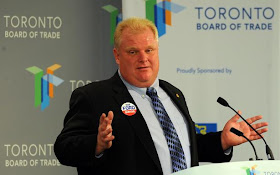Rob Ford has said of his secrecy and press availability that you ‘can’t hide 300 pounds of fun’, but questions remain as to who he is meeting during his regular duties. David Miller released a basic meeting schedule to the media each week but so far Team Ford has not chosen to do so.
Yesterday Toronto Star reporter Daniel Dale published the results of a Freedom of Information request for Rob Ford’s meeting schedule. It was predictable, with the majority of meetings being with allies and community supporters. A question remains though, what actually goes on in these meetings?
In the absence of more transparency than necessary, I’ve taken a wild guess as to what a meeting might look like by looking at the June 7 meeting between Rob Ford, Giorgio Mammoliti, and Police Chief Bill Blair. I also took the liberty to add in Ford’s guardian angel/spokeswoman Adrienne Batra.
 |
| Toronto Star |
FORD: Hey guys, sorry I’m late. You know, caught in traffic.
BLAIR: Good to see you Mr. Mayor.
MAMMOLITI: Friggin’ traffic. It’s the worst. Where’d you get stuck?
FORD: Jarvis and Gerrard. Some Prius was taking forever making a turn, but I flipped them off good—
BATRA: --How about we start the meeting boys? You know, huddle around and talk strategy?
FORD: I love it when you speak Football Adrienne. That’s why you’re the word person, haha.
BATRA: Yeah, so the budget pressures…
BLAIR: Thank you Adrienne. My team has prepared the materials you see on the table. I know they’re complicated and detailed but we’ll be happy to walk you through them.
MAMMOLITI: You have everything you need in there?
BLAIR: Yes, we feel this best balances the needs of—
FORD: Aw, you’re good Billy. I know I can trust you with the details.
BLAIR: Thank you Mr. Mayor, that means a lot to me.
MAMMOLITI: Wait, something is missing.
FORD: What’s that? Are you telling me there are no choppers in there?
MAMMOLITI: Yeah, you wanted those, right?
FORD: C’mon Bill, you don’t need to get modest with us.
BLAIR: Well it’s not really a priority Mr. Mayor. We’re trying our best to only fill our needs.
FORD: Will you look at this guy Georgie? What a team player.
MAMMOLITI: Oh, he gets the thumbs up from me.
FORD: I’ve seen The Wire Bill, and it’s obvious that we need choppers. We just can’t be taken seriously otherwise.
BLAIR: I appreciate the concern Mr. Mayor and I’ll look into it.
FORD: Do you see this guy Adrienne? That’s a good brush off, isn’t it?
BATRA: Very good. Even Denzil could learn from him.
FORD: That’s high praise Bill.
MAMMOLITI: It is. But really, look into it. Think creatively—you could attach extra sound cannons to them!
BLAIR: That’s an interesting idea. Say, you have quite the tan Giorgio, did you travel recently?
MAMMOLITI: Yeah, I was in Halifax for a city conference thing. Oh man, the hot chicks there are amazing.
BATRA: Ahem.
MAMMOLITI: Sorry. Broads? Anyway, I’ll have some great photos when they’re developed.
FORD: He kept calling me during his trip and mentioning this, haha.
MAMMOLITI: I mostly talked business! You would mention the Halifaxians too.
BATRA: Haligonians.
FORD: No, no no. Don’t misrepresent me here.
MAMMOLITI: Haligonians?
FORD: I’m a family man.
BLAIR: I think I should get going.
MAMMOLITI: Haligonians? That’s a thing?
FORD: I have kids. I respect women. Right Adrienne?
BATRA: Yes sir.
FORD: See Bill, I’m a good guy, despite what Georgie might say.
BLAIR: I can see that Mr. Mayor.
BATRA: Ok gentlemen, this meeting is over.

















